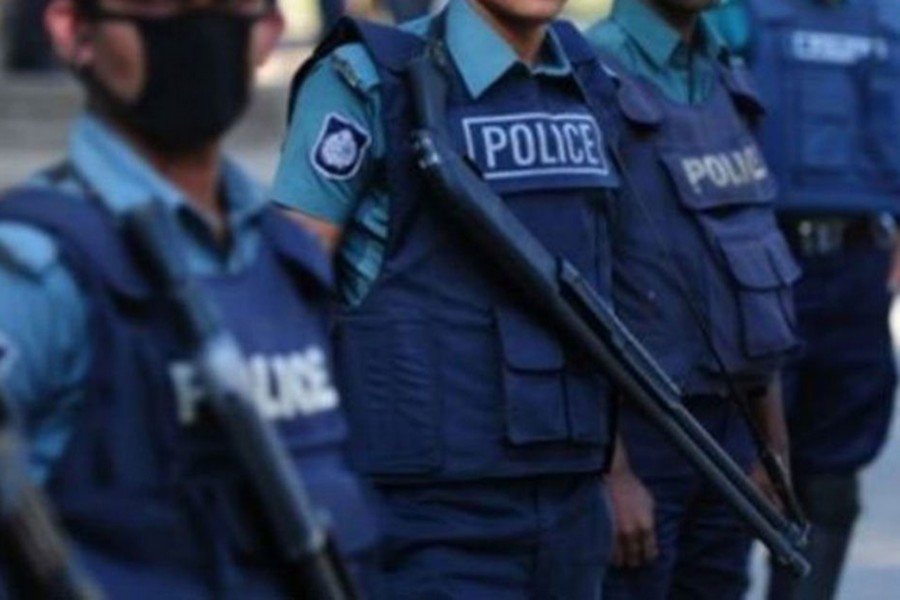
Published :
Updated :

One of the most vital ingredients and integral parts of democracy is a police force that abides by the law itself and is above reproach. In the aftermath of the student-mass upsurge that toppled the Sheikh Hasina government on August 05, Bangladesh police force has become totally dysfunctional and a serious law and order problem was created created all over Bangladesh. Frenzied mobs began looting, ransacking, and launching arson attacks here and there. The utterly shameful and barbaric scenes largely reflect the public's deep-seated anger towards the police brutality and the oppression of opposition activists. However, this unbridled rage cannot justify mob rule. Anarchists, whoever they may be, pose a serious threat to peace and stability and thus have no place in a civilised country.
When the angry mobs ran amok, the absence of the police, and other law enforcement agencies was particularly noticeable. It is their responsibility to maintain law and order and prevent such law-breaking occurrences. Apparently, the force had drawn so much public ire that police personnel were falling victim to mob violence, ambush, and murder, making it impossible for them to fulfill their duties. Against this backdrop, particularly on Tuesday evening, the Bangladesh Police Subordinate Employees Association announced an indefinite strike calling for ensuring their security, justice for the murder of their fellows, among others.
But the question remains, who is to blame for the deplorable state of the Bangladesh Police and how long will it continue to be like that?
A government's success is largely determined by the performance of its police force. For the police to be effective, it is essential that the force is independent, acts impartially, and operates without political interference. Unfortunately, successive governments have viewed the police as an extension of their party, blatantly politicising the force and creating a dual system of law: one for themselves and the other for the people. Rather than ensuring neutrality, as they ought, these governments have undermined it.
Some officers, however, welcomed this arrangement lured by myriads of opportunities it brought them. Thus their greed and partisanship rendered the police force all but a political weapon for the party in power.
At times, the law enforcers were engaged in assisting and promoting the political and self-serving activities of the government people and were not available to perform their proper duties. The main task of the police is to serve and protect, curb crime, and track down criminals. Instead, the force was frequently engaged in blocking opposition parties' agitation programmes, silencing criticism, and clamping down on legitimate protests.
While political interference in the work of law enforcers has been a chronic problem and needs to be addressed immediately, the law enforcers too have much to do to assert their independence. If they can prove their integrity, patriotism, and act strictly in accordance with the law, it would be difficult for any extraneous individual or group to turn them into a political tool. There is strength in numbers (as the students have proved) and if enough police officers raised objections and became whistle-blowers the problem would not have been created in the first place. The law enforcers should at least desist from being overzealous in performing tasks, which are beyond their mandate.
Then again, criticism of the police has long been raging unabated. It is alleged that bribery is institutionalised within the police department. It is often alleged that constables are given a target to raise extortion money by senior officers. Acting like the mafia in uniform, it is no secret a segment of unscrupulous police officers extort unlawful tolls from all types of transportation, including goods-laden trucks, passenger buses, and roadside businesses. Drivers who refuse to pay are often subjected to false charges. It is said that every new law is welcomed by them as it provides fresh opportunities to feather their nests.
Armed with this legal leverage, the police used to arbitrarily harass and arrest anyone without justification or proof of guilt, creating situations where bribes are demanded to make the issue disappear. In most cases, no credible reason was given for these arrests, and police authority was frequently abused for harassment and extortion.
The victims were primarily poor drivers or small traders-ordinary people who know it was wrong but had to pay to avoid the hassle. This rampant corruption that persisted for decades was believed to be a significant factor for hike in the prices of essential goods and fare of transportation.
Allegations were also rampant that top-ranking police officers pay huge bribes to get choice postings, knowing they will recoup that amount and considerably more in bribe money, after joining the posts. To eliminate this practice, it has been suggested that the police postings should be made through lottery. It is also suggested that the postings should be for a relatively brief period to prevent them from establishing liaison with local criminals.
And then, there is the issue of periodic "mass arrests" and the misuse of Section 54. There have been instances of mass arrests solely for the purpose of taking bribes. It goes without saying that there is something fundamentally wrong with their training and outlook that needs to be addressed. When law enforcers routinely misuse their power, it erodes public trust and undermines the very foundation of a just society. The current lawlessness and dysfunctional state of police is a reflection of that. Police reform is, therefore, urgent on many levels to offer protection to the people and the police themselves. The general police motto is to Protect and Serve. This principle needs to be upheld in Bangladesh.
aktuhin.fexpress@gmail.com


 For all latest news, follow The Financial Express Google News channel.
For all latest news, follow The Financial Express Google News channel.